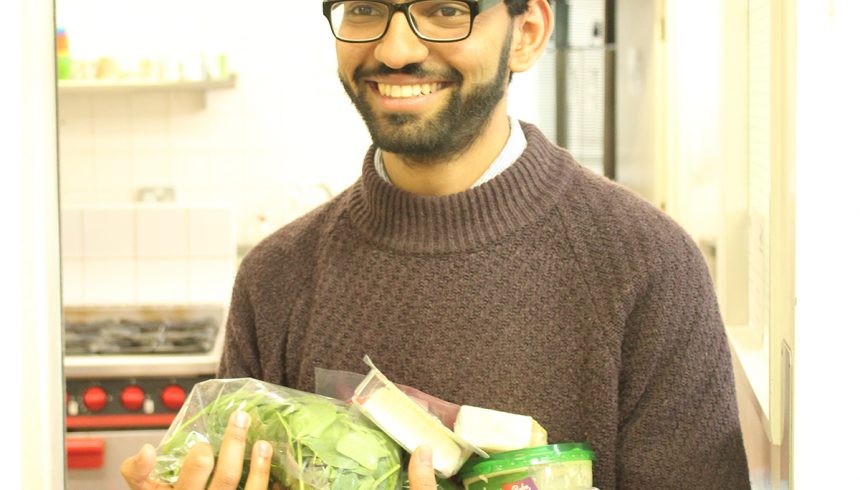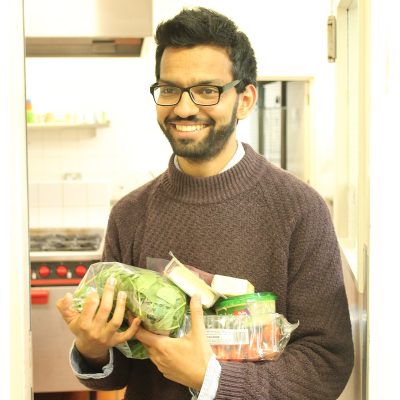The few week I have been working at the Jesuit Refugee Service has been full of beautiful, varied and challenging experiences – from having conversations with refugee friends, volunteers and staff, setting up for lunch, visiting an Immigration Removal Centre, experiencing outreach to a local parish, and – somewhat unexpectedly – learning to deep-fry large quantities of Jamaican-style chicken.
It has also been a wonderful opportunity to learn about the mission of JRS and the Society of Jesus, intimately connected as they are with one another. In particular, I have started to learn about what it means, what it looks like, to ‘walk with the poor, the outcasts of the world, those whose dignity has been violated, in a mission of reconciliation and justice.’
What will particularly stay with me is the quality of the relationships and space that exist in the Hurtado Centre, where JRS is based. People are welcomed and known; you are given a space to relax, to be yourself and to feel at home.
It is a quality which pervades the Centre, and is made manifest in all that goes on: from Thursday’s Day Centre to the activities which take place in the week. As Han, one the refugee friends, beautifully puts it: ‘When I came to JRS I found each volunteer trying to put in their best effort to welcome me with my name, which in itself is a source of comfort. Each time, each encounter gives me strength to fight for my life’. People are known, and encouraged to express their gifts and passions with others.
This quality of relationship and space is reminiscent of what St. Ignatius of Loyola calls Christ’s standard in his meditation, the Two Standards in the Spiritual Exercises. To be welcomed, to be known, to be liked so that I myself can relax, can be myself and can feel at home, wherever I am – this is the style of Jesus.
At the same time, I have learnt that the work of JRS involves going out to places of darkness and suffering. JRS and the Society of Jesus is built on risk-taking and boldness in walking towards places of darkness or what St. Ignatius, in the same meditation, calls the Enemy’s standard. This is particularly evident in visits to the Immigration Removal Centres. I was taken aback to learn how these places operate: where people are effectively imprisoned without trial and indefinitely detained without having committed a crime, cut off and isolated from wider society. There is a brutal culture of being anonymous, of being trapped and of being accused, where all are demeaned and dehumanised.
It was emboldening to see how volunteers travel to these places every week: to visit and simply be present with others. I have gained a glimpse of just how difficult this can be. Whilst my own instinct is to enjoy places of sanctuary and goodness, it seems that the vocation of the Society, as exemplified by JRS, involves walking towards these places of darkness and suffering – wherever they may be – because it is in those very places that we can encounter those most in need, and attend ‘to needs that others are not attending to’.
Finally, it has been a privilege to observe and learn from the manner in which people work, expressed well in the exhortation of St. Paul: ‘Rejoice with those who rejoice, weep with those who weep’ (Romans 12:15)
This is what the staff, volunteers and refugee friends do so wonderfully. On the one hand, rejoicing with those who rejoice: laughing, encouraging, shaking hands, embracing, delighting in the lives and joys of others. Whereas I am often tempted to become overly self-conscious, to compare myself with and feel jealous about others, the movement of the Spirit encourages everyone to delight in the flourishing of others: to ‘rejoice in the good of others as if it were your own.’
On the other hand, weeping with those who weep. Staff, volunteers and refugee friends are close to one another, offering to be with and listen to each other during times of anguish. Whereas I am easily tempted to feel suspicious, to be cold and indifferent towards others or – at the other extreme – to fall into a state of despair, paralysis and indignation after hearing stories of suffering, it has been instructive and encouraging to see how people share in the suffering of others without being overwhelmed – silently holding in hope.
As Holy week approaches, perhaps it is helpful to contemplate Our Lady at the foot of the Cross. She teaches us how to accompany those who suffer. ‘Without yielding to evasions or illusions, “she accompanied the suffering of her Son; she supported him by her gaze and protected him with her heart. She shared his suffering, yet was not overwhelmed by it.’ As Easter approaches, I pray that she may teach me and continue to teach the whole Society how to accompany those in pain and so to experience more deeply the infinite tenderness and compassion of the Lord: healer, comforter and consoler.
Dunstan Rodrigues nSJ is a Jesuit novice who has spent 6 weeks working with JRS as part of his formation



